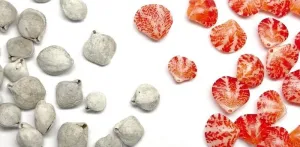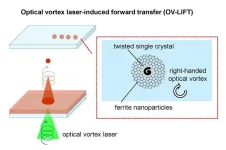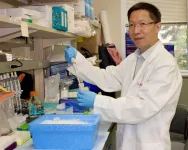(Press-News.org) 4D Medicine, a spin-out from the Universities of Birmingham and Warwick has raised £3.4m ($4.4m) in a Series A investment.
The funding round was backed by Oshen Holdings, DSW Ventures, SFC Capital, Boundary Capital and private investors including several leading scientists and surgeons. It will enable the company to complete pre-clinical testing of its first product range and seek FDA clearance for entry into the US market.
4D is a UK-based company whose innovative biomaterial has potential to be used for a wide range of 3D printed implants and surgical devices. Its product 4Degra is a resorbable biomaterial that is being used to develop implants such as orthopaedic devices or soft tissue scaffolds to help patients recovering from surgery or injuries. Preliminary testing has shown that as healing progresses, the biomaterial gradually erodes and is resorbed by normal metabolic processes as natural tissue grows back in its place.
4Degra promises some key advantages over existing resorbable biomaterials used for implants. With some materials, the entire product breaks down rapidly, creating acidic by-products that can cause pain, inflammation and cysts. By contrast 4Degra degrades gradually, starting from the surface, and does not release harmful acidic by-products.
4Degra can be 3D printed to create complex geometries. As it can be produced in both soft and hard formulations, it also has the potential to be used both for flexible products such as films and membranes, or where a more rigid product is required such as plates, pins and bone scaffolds.
4D Medicine was founded in 2020 as a spin-out from the Universities of Birmingham and Warwick and is now based in Nottingham. The latest funding brings the total raised to date to £5m. The company is now preparing to raise a Series B investment early next year.
Philip Smith, the company’s CEO, commented: “I would like to thank all our investors for their trust and support. Our success in continuing to raise investment despite the difficult market conditions over the last few years is testament to their belief in the company’s commercial potential and our world-class team. The funds will be used to complete the pre-clinical testing of our first medical device product range and our preparations for entry into the orthopaedic market”.
Didier Cowling, Partner at Oshen Holdings added: “We were delighted to lead this deal and we look forward to working with the 4D team. The company is now poised to make a substantial impact in the bioresorbable medical device space. We believe that 4Degra is a real game-changer that is enabling 4D to develop novel bioresorbable medical devices with unique properties.”
Doug Quinn, Partner at DSW Ventures, commented: “4D’s novel biomaterial platform opens up new possibilities for implants and devices. The company has already attracted attention from large industry players including a potential acquirer. This funding will enable it to apply for regulatory clearance in the US and target opportunities in the £5bn market for resorbable medical devices.”
Jason Druker, Portfolio Manager at SFC Capital said: “We are delighted to refresh our commitment to Phil and the 4D team. Since we first invested four years ago, they have made great progress and we’re excited to see the impact of their first medical device products”.
A team from Addleshaw Goddard led by George Danczak provided corporate legal advice to the company, with Hill Dickinson advising on matters including the requirements of the National Security Investment Act. Eleanor Baird at Weightmans advised DSW Ventures and Mercia.
END
4D Medicine raises £3.4 million for unique biomaterial platform
4D Medicine, a spin-out from the Universities of Birmingham and Warwick has raised £3.4m ($4.4m) in a Series A investment
2024-07-25
ELSE PRESS RELEASES FROM THIS DATE:
Ancient marine animal had inventive past despite being represented by few species, new study finds
2024-07-25
The findings, published today in Nature Ecology & Evolution, sheds light on some core principles of the evolution of modern biodiversity.
In current oceans, molluscs such as clams, oysters, and snails are hugely diverse, with over 50,000 species, whereas brachiopods are rare by comparison with only 394 species known. But this was not always the case. The team have found that brachiopods were evolving new shell shapes and ecological behaviours following the end-Permian mass extinction which compromised their numbers.
“In the Palaeozoic, from 540 to 250 million years ago, brachiopods ruled the seabed,” ...
Quantum sensor for the atomic world developed through international scientific collaboration
2024-07-25
In a scientific breakthrough, an international research team from Germany's Forschungszentrum Jülich and Korea's IBS Center for Quantum Nanoscience (QNS) developed a quantum sensor capable of detecting minute magnetic fields at the atomic length scale. This pioneering work realizes a long-held dream of scientists: an MRI-like tool for quantum materials.
The research team utilized the expertise of bottom up single-molecule fabrication from the Jülich group while conducting experiments at QNS, utilizing the Korean team’s leading-edge ...
The research was wrong: study shows moderate drinking won’t lengthen your life
2024-07-25
PISCATAWAY, NJ – Probably everyone has heard the conventional wisdom that a glass of wine a day is good for you--or you’ve heard some variation of it. The problem is that it’s based on flawed scientific research, according to a new report in the Journal of Studies on Alcohol and Drugs.
Over the years, many studies have suggested that moderate drinkers enjoy longer lives with lower risks of heart disease and other chronic ills than abstainers do. That spurred the widespread belief that alcohol, in moderation, can be a health tonic. However, not all studies have painted such a rosy picture--and the ...
Save your data on printable magnetic devices? New laser technique’s twist might make this reality
2024-07-25
The proliferation of all things digital doesn’t mean that printing technology is no longer relevant. In fact, printing technology is required to make the semiconductors necessary for the digital world. And as an Osaka Metropolitan University-led team has shown using a new printing technique, printable magnetic devices for high-density data storage might soon be realized.
Dr. Ken-ichi Yuyama, a lecturer at the Graduate School of Science, and his colleagues report in APL Materials on the development of a new type of laser-induced forward transfer ...
Early onset dementia more common than previously reported – the incidence of Alzheimer’s disease seems to be on the rise
2024-07-25
A new major study by the University of Eastern Finland, the University of Oulu and Neurocenter Finland explored early-onset dementia in the working-age population in Finland. The study cohort was one of the largest in the world to date, and the findings were published on 24th of July 2024 in Neurology®, the medical journal of the American Academy of Neurology.
Current epidemiological data on early-onset dementia is scarce and based on small study cohorts, with no recent data from Finland available. For the present ...
Pesticides potentially as bad as smoking for increased risk in certain cancers
2024-07-25
In modern day agriculture, pesticides are essential to ensure high enough crop yields and food security. These chemicals, however, can adversely affect plant and animal life as well as the people exposed to them.
Now, in a population-based, nation-wide study, researchers in the US have put increased cancer risk through agricultural pesticide use into context with smoking, a better understood cancer risk factor. The results were published in Frontiers in Cancer Control and Society.
“In our study we found that for some cancers, the effect of agricultural pesticide usage is comparable in magnitude to the effect of smoking,” said the study’s ...
NUS researchers develop new battery-free technology to power electronic devices using ambient radiofrequency signals
2024-07-25
Ubiquitous wireless technologies like Wi-Fi, Bluetooth, and 5G rely on radio frequency (RF) signals to send and receive data. A new prototype of an energy harvesting module – developed by a team led by scientists from the National University of Singapore (NUS) – can now convert ambient or ‘waste’ RF signals into direct current (DC) voltage. This can be used to power small electronic devices without the use of batteries.
RF energy harvesting technologies, such as this, is essential as they reduce battery dependency, extend device lifetimes, minimise environmental impact, and enhance the feasibility of wireless sensor networks and IoT devices in remote ...
New protein discovery may influence future cancer treatment
2024-07-25
Researchers from the University of Otago, Christchurch, have spearheaded the discovery of a protein function which has the potential to guide the development of novel cancer treatment options and improve the diagnosis of various cancers.
The exciting research finding, carried out alongside Dr Vanessa Morris from the University of Canterbury’s School of Biological Sciences as well as researchers in Australia and Denmark, centres on the activity of a tumour- suppressing protein called p16.
The discovery, published in the British scientific journal Nature Communications and first authored by ...
Timing matters: Scripps Research study shows ways to improve health alerts
2024-07-25
LA JOLLA, CA—When seemingly healthy people receive an alert from a wearable sensor telling them they might have a respiratory virus—based on small changes in their unique heartrate, sleep and activity patterns—what do they do? According to a new study by Scripps Research scientists carried out at the height of the COVID-19 pandemic, only a quarter of people follow up such an alert with an at-home viral test.
That is just one conclusion of the new study, published in The Lancet Digital Health on July 24, 2024, which tested the feasibility ...
New gene therapy approach shows promise for Duchenne muscular dystrophy
2024-07-25
INDIANAPOLIS - Indiana University School of Medicine researchers have made a significant breakthrough in developing a new gene therapy approach that restores full-length dystrophin protein, which could lead to new treatments for people with Duchenne muscular dystrophy (DMD).
The study, recently published in Nature Communications, demonstrates the effectiveness of their novel gene therapy technology in improving muscle tissue and overall strength in mice models with Duchenne ...
LAST 30 PRESS RELEASES:
1 in 6 Medicare beneficiaries depend on telehealth for key medical care
Maps can encourage home radon testing in the right settings
Exploring the link between hearing loss and cognitive decline
Machine learning tool can predict serious transplant complications months earlier
Prevalence of over-the-counter and prescription medication use in the US
US child mental health care need, unmet needs, and difficulty accessing services
Incidental rotator cuff abnormalities on magnetic resonance imaging
Sensing local fibers in pancreatic tumors, cancer cells ‘choose’ to either grow or tolerate treatment
Barriers to mental health care leave many children behind, new data cautions
Cancer and inflammation: immunologic interplay, translational advances, and clinical strategies
Bioactive polyphenolic compounds and in vitro anti-degenerative property-based pharmacological propensities of some promising germplasms of Amaranthus hypochondriacus L.
AI-powered companionship: PolyU interfaculty scholar harnesses music and empathetic speech in robots to combat loneliness
Antarctica sits above Earth’s strongest “gravity hole.” Now we know how it got that way
Haircare products made with botanicals protects strands, adds shine
Enhanced pulmonary nodule detection and classification using artificial intelligence on LIDC-IDRI data
Using NBA, study finds that pay differences among top performers can erode cooperation
Korea University, Stanford University, and IESGA launch Water Sustainability Index to combat ESG greenwashing
Molecular glue discovery: large scale instead of lucky strike
Insulin resistance predictor highlights cancer connection
Explaining next-generation solar cells
Slippery ions create a smoother path to blue energy
Magnetic resonance imaging opens the door to better treatments for underdiagnosed atypical Parkinsonisms
National poll finds gaps in community preparedness for teen cardiac emergencies
One strategy to block both drug-resistant bacteria and influenza: new broad-spectrum infection prevention approach validated
Survey: 3 in 4 skip physical therapy homework, stunting progress
College students who spend hours on social media are more likely to be lonely – national US study
Evidence behind intermittent fasting for weight loss fails to match hype
How AI tools like DeepSeek are transforming emotional and mental health care of Chinese youth
Study finds link between sugary drinks and anxiety in young people
Scientists show how to predict world’s deadly scorpion hotspots
[Press-News.org] 4D Medicine raises £3.4 million for unique biomaterial platform4D Medicine, a spin-out from the Universities of Birmingham and Warwick has raised £3.4m ($4.4m) in a Series A investment





